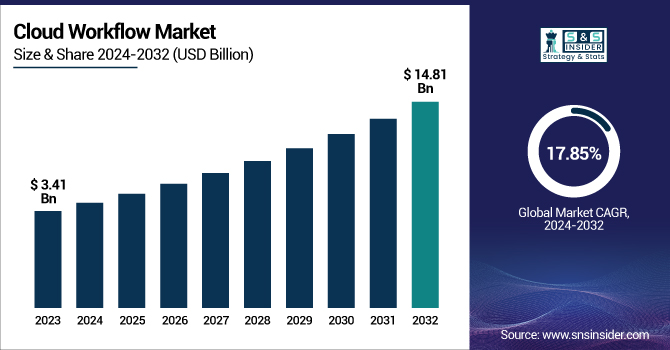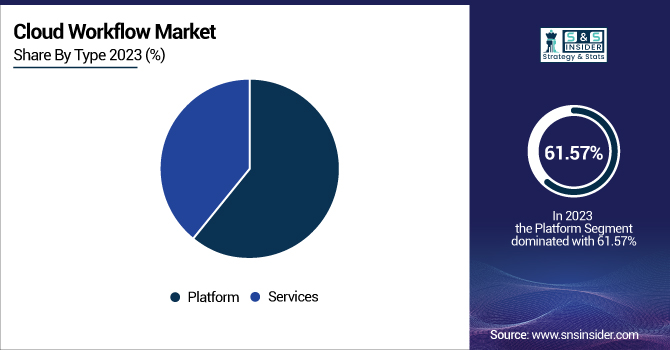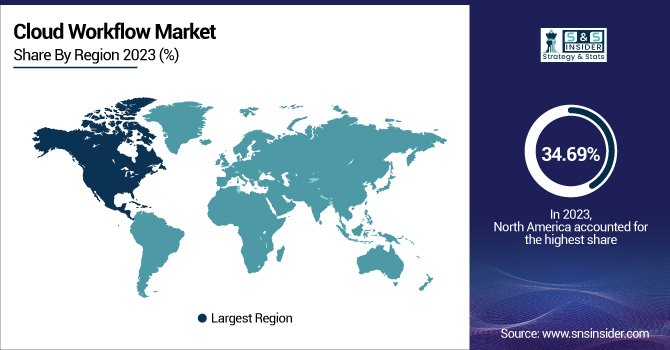Cloud Workflow Market Report Scope & Overview:
The Cloud Workflow Market Size was valued at USD 3.41 Billion in 2023 and is expected to reach USD 14.81 Billion by 2032 and grow at a CAGR of 17.85% over the forecast period 2024-2032.

To Get more information on Cloud Workflow Market - Request Free Sample Report
The Cloud Workflow Market is growing rapidly due to growing digitization and automation, as well as a rising emphasis on transforming a cloud environment. Cloud-based workflow solutions are being utilized by organizations from Different industries to address the need for greater business efficiency, better collaboration, and lower operational costs. We are seeing an increasing demand in the market for AI-based workflow automation and seamless integration with enterprise applications. The five major growth drivers of the market are real-time processing of data, robust regulatory compliance, and remote workforce management. From SMEs to large enterprises, businesses are investing in enabling cloud workflow solutions to foster responsible business processes.
The Cloud Workflow Market is projected to grow from USD 0.81 billion in 2023 to USD 3.37 billion by 2032, at a CAGR of 17.26% from 2024 to 2032 In U.S. The U.S. Cloud Workflow Market is set to grow highly in the coming years. Businesses are leveraging cloud workflow solutions to improve operational efficiency, drive collaboration, and ensure adherence to regulations. The market is characterized by robust IT infrastructure, high cloud adoption, and investment in AI-enabled automation. Financial services (BFSI), healthcare, retail, and IT are some major industries that are using these solutions to enable process optimization. The competitors include major technology players with a focus on innovation, integration, and security improvements.
Cloud Workflow Market Dynamics
Key Drivers
-
Increasing Adoption of Cloud-Based Automation Solutions Enhances Efficiency in Business Operations and Drives Cloud Workflow Market Growth
Cloud-based workflow solution market is growing rapidly, owing to the increasing demand for automation and digital transformation across various industries. Cloud-based automation is being increasingly used by enterprises to improve operational efficiency, minimize manual intervention, and streamline workflows. The adoption of real-time data processing, integration of enterprise applications, and remote workforce management requirements are also propelling the deployment of edge with organizations, thus creating further demand in the edge computing & analytics market. The cloud workflow market is increasing steadily as enterprises move towards AI-led automation and smart workflows, particularly in industries such as IT, BFSI, healthcare, and retail.
Restraint
-
Data Security and Privacy Concerns Limit Widespread Adoption of Cloud Workflow Solutions Across Highly Regulated Industries
Even though there are various benefits of cloud workflow solutions, there are data security and privacy issues that act as a major restraint in the growth of the market. Industries requiring compliance (BFSI, healthcare, etc), being highly regulated in governance and policy compliance issues, are always hesitant to migrate sensitive data to the cloud owing to the risks of cyber threats, unauthorized access, and compliance issues. Organizations need to comply with high regulatory requirements such as GDPR, HIPAA, CCPA, etc. and this can make it challenging to implement cloud workflow solutions. Also, fear of third-party access, data breaches, and no control over data hosted within the cloud make several enterprises to adopt cloud workflows at a slow rate.
Opportunity
-
Integration of Artificial Intelligence and Machine Learning in Cloud Workflow Solutions Creates New Growth Prospects for Market Expansion
The cloud workflow market has a huge growth opportunity due to the increasing adoption of artificial intelligence (AI) and machine learning (ML) in workflow solutions. Making the process more automated through AI-powered workflows means providing predictive analysis, making intelligent decisions, and optimizing processes. AI-driven insights empower businesses to increase efficiency, decrease errors, and expedite task completion. The industry leaders can maintain a competitive advantage by making their AI-enabled cloud workflow investments that result in more thorough, intelligent, and customer-powered automation. AI and ML will continue to see growing advancements as technologies; enabling more innovation in the cloud workflow market.
Challenge
-
Integration Complexities and Compatibility Issues with Existing Enterprise Systems Hinder Seamless Cloud Workflow Adoption
Daily doses of insights for the executive and innovative business leader. Legacy IT infrastructure is common among many businesses making it challenging to get seamless interoperability between cloud and on-premises applications. These compatibility issues could create operational disruptions, data silos, and inefficiencies in enterprises and discourage them from adopting the cloud at scale. The absence of integration frameworks such as the two outlined above means that businesses will struggle to optimize cloud workflow solutions, which may affect adoption rates and overall market growth.
Cloud Workflow Market Segment Analysis
By Type
The Platform segment accounted for 61.57% of the total, in 2023, the largest share of revenue in the Cloud Workflow Market, owing to the growing demand for no-code workflow automation and low-code platforms. Companies like Microsoft with Power Automate, ServiceNow, and IBM Cloud Pak for Business Automation have led the charge on the platform front, introducing new AI-driven workflow platforms aimed at helping organizations improve their automation of business processes. As organizations focus on agility and efficiency, we expect to see the continued evolution of businesses as platform-based cloud workflow solutions thrive and innovate for mass enterprise adoption.
The Services segment is expected to hold the highest CAGR of 18.42% and is driven by the growing traction for cloud consulting, implementation, and managed services. Cloud workflow services Companies such as AWS, Oracle and IBM have begun to improve their cloud workflow service capabilities to enable a seamless integration of automation in business. Cloud workflow consultants from Accenture and Deloitte recently doubled down, while Google Cloud introduced AI-powered professional services to streamline workflow. Cloud adoption is continuously increasing among SMEs and large enterprises, resulting in the growing demand for customized workflow services.

By Enterprise Size
The large enterprises segment held the largest market share of 57.42% in 2023. Physical business processes are still in focus for large corporations seeking workflow automation as a means to streamline operations and maximize productivity and collaboration across worldwide teams. Businesses such as ServiceNow and Microsoft are continuously innovating in this space with ServiceNow rolling out its AI-powered workflow automation tools and Microsoft making its Power Automate platform more seamless for enterprise integrations.hw. With an increasing number of large enterprises transitioning to cloud-based workflows for digital transformation, this segment continues to generate a significant share of market revenue, maintaining its leadership position.
The SME segment witnesses the highest CAGR of 19.93%, owing to the rising adoption of cost-effective cloud workflow solutions. Cloud-based automation is being adopted by small and medium-sized businesses to streamline processes, lowering operating costs and increasing scalability. Companies like Zoho, Monday. Com and Asana target this segment with easy-to-use workflow tools integrated with AI. Automation features for SMEs: Google recently added some automation features to Google Workspace, which has increased adoption.
By Applications
In 2023, the Sales and Marketing segment held the largest revenue share in the Cloud Workflow Market, at 19.81%, owing to the rising use of cloud-based automation for lead management, customer engagement, and campaign execution. Other companies including Salesforce and HubSpot have begun to release AI-powered workflow systems to streamline marketing automation and sales pipelines. Adobe added next-gen AI-driven analytics in Adobe Experience Cloud, improving workflow efficiency. This segment is on the rise due to the increasing need for real-time customer insights and seamless CRM integration. Such tools like Cloud-based workflow systems help organizations to fasten sales work processes, increase productivity, and strengthen data-driven marketing strategies.
The Customer Support segment is expected to grow at the highest CAGR of 18.98% over the forecast period due to the increasing need for AI-based chatbots, automated ticketing systems, and cloud-based helpdesk solutions. Zendesk and Freshdesk are among the crop of companies that extended their cloud workflow with AI-driven automation to accelerate response and customer interaction times. These features include AI-powered case resolution in Dynamics 365 Customer Service, and streamlining support workflows.
By Vertical
BFSI captured a sizeable share of the Cloud Workflow Market revenue in 2023 at 25.80%, owing to the growing adoption of cloud-based automation to provide effective operation efficiency, risk management, and regulatory compliance. Workflow automation is being deployed by financial institutions to improve customer onboarding, fraud detection, and the digital banking experience. IBM released Cloud Pak for Business Automation, which makes banking workflows more efficient in 2023, and Salesforce revealed Financial Services Cloud updates to improve customer interaction.
The Healthcare segment is anticipated to register the highest CAGR of 20.19% over the forecast period due to growing demand for automated workflows in areas such as patient management, telemedicine, and regulatory compliance. Having this means less administration cost as cloud workflow solutions can integrate this information to your EHRs seamlessly. In 2023, Microsoft added to its Cloud for Healthcare offerings with AI-led workflow automation, and Oracle rolled out enhanced cloud-based EHR analytics capabilities.
Regional Analysis
North America accounted for the highest revenue share of 34.69% in the cloud workflow market, owing to a high cloud adoption rate, robust IT infrastructure, and increasing digital transformation across enterprises. Enterprise giants like Microsoft, IBM, and ServiceNow are doubling down on cloud workflow. In 2023, ServiceNow introduced AI-powered workflow automation tools to enhance business process efficiencies, and Microsoft extended its Power Automate platform with intelligent automation capabilities.
The cloud workflow market is growing at phenomenal rates globally, with the fastest growth in the Asia Pacific region CAGR 21.80% driven by growing cloud adoption, government digitalization initiatives, and a booming IT sector. Asia including China, India, and Japan helps drive demand for cloud workflow automation. In 2023, Alibaba Cloud announced workflow automation tools for business, while Zoho expanded its cloud-based workflow tools for SMEs. Organizations in the region’s growing e-commerce, BFSI, & manufacturing sectors are using cloud workflows to enhance operational agility & cost efficiency.

Get Customized Report as per Your Business Requirement - Enquiry Now
Key Players
-
TALOS Workforce Solutions – (TALOS Time & Attendance, TALOS HR Management)
-
Verint Systems Inc. – (Verint Workforce Management, Verint Engagement Management)
-
MPEX Solutions – (MPEX Payroll, MPEX HR Management)
-
Ascentis Corporation – (Ascentis Payroll, Ascentis Recruiting)
-
Synel – (Synel Time & Attendance, Synel Workforce Management)
-
SAP SE – (SAP SuccessFactors, SAP Workforce Management)
-
WorkForce Software, LLC – (WorkForce Suite, EmpCenter Workforce Management)
-
The Hackett Group, Inc. – (Hackett Benchmarking, Hackett Digital Transformation Platform)
-
IBM Corporation – (IBM Cloud Pak for Business Automation, IBM Watson Orchestrate)
-
Workday, Inc. – (Workday Human Capital Management, Workday Financial Management)
-
Amdocs – (Amdocs Optima, Amdocs Customer Experience Suite)
-
Telefonaktiebolaget LM Ericsson – (Ericsson Dynamic Orchestration, Ericsson Operations Engine)
-
Huawei Technologies Co., Ltd. – (Huawei Cloud WeLink, Huawei FusionInsight)
Recent Trends
-
February 2024 – Released an upgraded MPEX HR Management Suite with real-time workflow automation and cloud-based payroll integration.
-
January 2024 - TALOS introduced an AI-driven workforce scheduling system to optimize labor management and reduce compliance risks.
| Report Attributes | Details |
|---|---|
| Market Size in 2023 | US$ 3.41 Billion |
| Market Size by 2032 | US$ 14.81 Billion |
| CAGR | CAGR of 17.85% From 2024 to 2032 |
| Base Year | 2023 |
| Forecast Period | 2024-2032 |
| Historical Data | 2020-2022 |
| Report Scope & Coverage | Market Size, Segments Analysis, Competitive Landscape, Regional Analysis, DROC & SWOT Analysis, Forecast Outlook |
| Key Segments | • By Type (Platform, Services) • By Applications (Human Resource, Sales and Marketing, Accounting and Finance, Customer Support, Procurement and Supply Chain, Operations, Others) • By Enterprise Size (SMEs, Large Enterprises) • By Vertical (BFSI, IT & Telecom, Retail and E-commerce, Healthcare, Government, Others) |
| Regional Analysis/Coverage | North America (US, Canada, Mexico), Europe (Eastern Europe [Poland, Romania, Hungary, Turkey, Rest of Eastern Europe] Western Europe] Germany, France, UK, Italy, Spain, Netherlands, Switzerland, Austria, Rest of Western Europe]), Asia Pacific (China, India, Japan, South Korea, Vietnam, Singapore, Australia, Rest of Asia Pacific), Middle East & Africa (Middle East [UAE, Egypt, Saudi Arabia, Qatar, Rest of Middle East], Africa [Nigeria, South Africa, Rest of Africa], Latin America (Brazil, Argentina, Colombia, Rest of Latin America) |
| Company Profiles | TALOS Workforce Solutions, Verint Systems Inc., MPEX Solutions, Ascentis Corporation, Synel, SAP SE, WorkForce Software, LLC, The Hackett Group, Inc, IBM Corporation, Workday, Inc., Amdocs, Telefonaktiebolaget LM Ericsson, Huawei Technologies Co., Ltd. |

